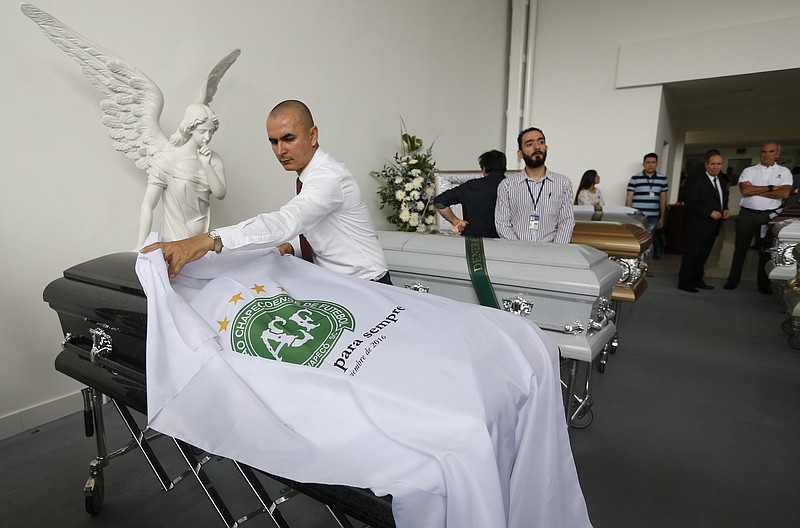MEDELLIN, Colombia-Authorities prepared Thursday to transport home the bodies of dozens of victims of this week's air tragedy in Colombia as grief turned to anger amid indications the airliner ran out of fuel before slamming into the Andes. Bolivian aviation officials announced they were indefinitely suspending the charter company that operated the flight.
Many of the victims were players and coaches from a small-town Brazilian soccer team that was headed to the finals of one of South America's most prestigious tournaments after a fairy-tale season that had captivated their soccer-crazed nation.
On Thursday, row upon row of caskets, many covered with white sheets printed with the logo of the Chapocoense soccer team, filled a Medellin funeral home in preparation for being flown home, as family members of some victims gathered there to say their final goodbyes.
Grieving relatives of the dead spoke out in disbelief after a recording of conversations between a pilot of the doomed flight and air traffic controllers, as well as the account of a surviving flight attendant, indicated the plane ran out of fuel before crashing late Monday, killing all but six of the 77 people on board.
Osmar Machado, whose son, Filipe, a defender on the Chapecoense team, died on his father's 66th birthday, questioned why the plane, which was flying at its maximum range on the flight from Santa Cruz, Bolivia, was transporting the team.
"Profit brings greed," Machado said, speaking in the Brazilian team's hometown of Chapeco. "This plane ended (the lives of) 71 people."
Williams Brasiliano, uncle of midfielder Arthur Maia, said the crash was avoidable if the team had chosen a commercial airline to travel to Colombia-not a charter.
"Look how complicated that flight was going to be even if it had arrived," Brasiliano said tearfully of the team's itinerary, which included a flight from Sao Paulo to Bolivia on a commercial airliner before the ill-fated flight to Medellin.
"Even if they had arrived, it is clear that they would be tired from the trip to play a final. This can't be right. I doubt that a bigger club would have done the same," he said.
Chapecoense spokesman Andrei Copetti defended the team's decision, saying that more than 30 clubs had used the Bolivia-based company, LaMia airlines, including Argentina and Bolivia, and that the team itself had flown on its flights before.
"They had a good service then. It was the airline that got in touch with us because they have experience in doing these long flights in South America," he said.
A recording of the flight's final minutes showed the pilot repeatedly requested permission to land because of "fuel problems," although he never made a formal distress call. He was told another plane had been diverted with mechanical problems and had priority for the airport's single runway, and was instructed to wait seven minutes.
As the jetliner circled in a holding pattern, the pilot grew more desperate. "Complete electrical failure, without fuel," he said before the plane went down.

